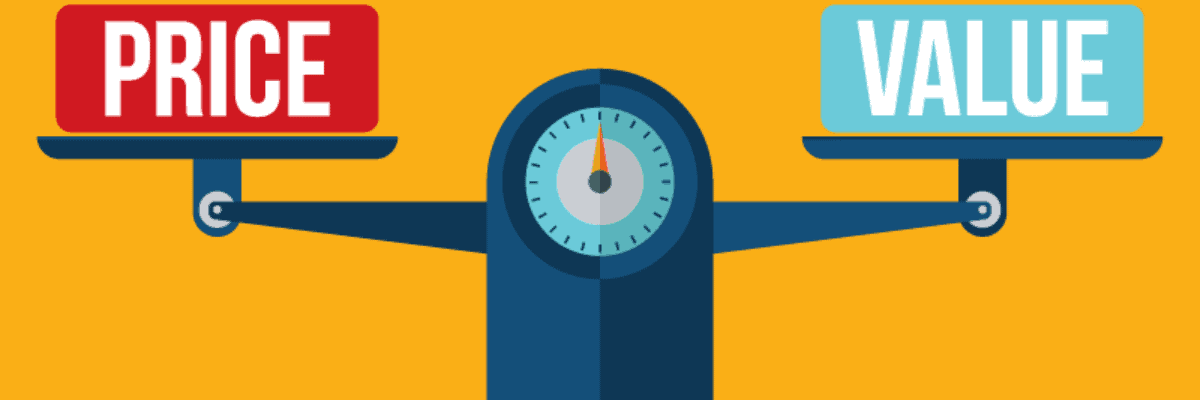
Product Over Price: How To Beat “Your Prices Are Too High”
Written By: Ian Altman
I promise that it is almost NEVER about price. But, if it is, here is what probably went wrong. You jumped to what you were selling instead of focusing on the issue they needed to solve. You failed to engage the customer in a discussion about their past experiences in similar projects.
After a recent Immersion Workshop, someone asked: “What do we do when the customer comes back saying that we were not selected because our price was too high?” Excellent question! It’s pretty common for clients to give price as their reason for picking one vendor over another.
So what should you do about it? Let’s start by understanding what the client might really mean when your client says “Your price is too high”.
What Could Be Going On
There are two potential scenarios to consider:
- First, you might actually provide the same thing as another vendor for a higher price. Unfortunately, you need to recognize that rarely will another vendor offer the exact same solution as you. Unless you are selling a drop-shipped commodity, there is always room for differentiation.
- Second, the client has another reason why they selected the other vendor; however, they thought saying “Your price is too high” would be more polite than telling you the real reason.
Imagine this example: You have a new project at your company. Several vendors bid on the project, including your friend’s company. The selection committee picks another company because they thought your friend’s presentation was horrible.
Your friend asks you, “What happened? Why wasn’t I picked?” Not many people would say, “We thought you sucked.” Alternatively they might say to the friend, “We selected another vendor who the committee thought was a better value”.
Many a “white lie” has been said to spare the vendor’s feelings. It feels better as the seller to say, “They undercut us” than it feels to say, “They outsold us.”
What If It Actually Is About Price?
I’m covering this section just to be polite. I promise that it is almost NEVER about price. But, if it is, here is what probably went wrong. You jumped to what you were selling instead of focusing on the issue they needed to solve.
You failed to engage the customer in a discussion about their past experiences in similar projects. You did not share stories about issues other clients faced that you helped to solve. In short, you did not do anything to help you stand out from the competition. So, you reinforced the customer’s initial belief that you were just selling a commodity.
In many cases, the seller is the one who frames the discussion about price. You might ask your potential client how much they are paying their current provider. At that point, many sellers will say, “Maybe we can get you a better deal.”
What if instead you asked “0-10, how happy are you with the current provider?” You can either provide a better outcome, or a better price. Without a better outcome, why would they switch to you other than price?
You might be thinking “But it is a bidding situation. We didn’t have access to anyone”. When your organization was making a recent purchase with a bid process, did each member of your team have a ‘favorite’ vendor? The one they hoped would win? Of course. Your customers do, too.
If you are not the one they are hoping will win, someone else is. Ask yourself what percentage of deals you win when you don’t have a chance to discuss the project with the customer in advance. If the number is less than 10%, then make a decision to not bid those projects unless you can have a conversation with the customer.
If you think the number is greater than 10%, then you might be kidding yourself. In most cases, we discover that companies win less than 5% of pursuits they chase without prior customer interaction.
How Can You Improve the Odds
Fight for that opportunity to speak with the customer. Can you provide the best advice to them if you have to respond without any additional information? Of course you cannot. It is in both your best interest and your clients that you ask thoughtful questions to determine if there is a fit between their situation and what you offer.
The key, however, is to make an honest assessment. You just might learn that you are not the best alternative.
In that case, let them know: “In this situation, we may not be the best solution. Would you be upset if we declined to participate?” You might be surprised at how quickly you get invited to the party for the next opportunity. See, clients are used to vendors insisting their solution is the best, even when it isn’t. Your candor will get noticed, and in most cases rewarded.
Demonstrate that you are always looking out for the client’s best interest. Make it clear that finding the right fit is more important that making the sale. If you do these things right, you just might become the vendor they all are hoping will win.
It’s Your Turn
When have you gone from the outsider to the insider? When do you see clients doing things that are not in their best interest?
About the author
Ian Altman
Ian Altman is a sought after speaker, author, and strategic advisor. Ian is the…
Get FREE Sales Training Delivered to Your Inbox
Join more than 360,000 professionals who get our weekly newsletter.
Related Articles

Learn Online
Self-paced courses from the
world's top sales experts

Virtual Training
Live, interactive instruction in small
groups with master trainers

Coaching
One-to-one personalized coaching
focused on your unique situation






